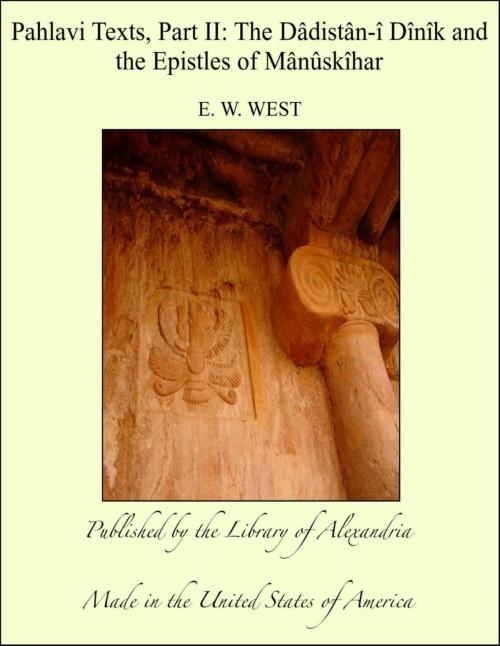Pahlavi Texts, Part II: The Dâdistân-î Dînîk and the Epistles of Mânûskîhar
Nonfiction, Religion & Spirituality, New Age, History, Fiction & Literature| Author: | E. W. West | ISBN: | 9781465573797 |
| Publisher: | Library of Alexandria | Publication: | March 8, 2015 |
| Imprint: | Language: | English |
| Author: | E. W. West |
| ISBN: | 9781465573797 |
| Publisher: | Library of Alexandria |
| Publication: | March 8, 2015 |
| Imprint: | |
| Language: | English |
THE Pahlavi texts selected for translation in this volume are distinguished from all others by the peculiarity that both the name and station of their author and the time in which he lived are distinctly recorded. His name, Mânûskîhar, son of Yûdân-Yim (or Gûsndam), is mentioned in each of the headings and colophons to the Dâdistân-î Dînîk and the three Epistles attributed to him. He is styled simply aêrpat, or 'priest,' in the headings of Eps. I and II, and aêrpat khûdâî, or 'priestly lordship,' in that of Ep. III; but he is called the rad, 'pontiff, or executive high-priest,' of Pârs and Kirmân, and the farmâdâr, 'director,' of the profession of priests, in the colophons; to Dd. and Ep. II.; and we learn from Dd. XLV, 5 that the farmâdâr was also. the pesûpâî or, 'leader' of the religion, the supreme high-priest of the Mazda-worshipping faith.
THE Pahlavi texts selected for translation in this volume are distinguished from all others by the peculiarity that both the name and station of their author and the time in which he lived are distinctly recorded. His name, Mânûskîhar, son of Yûdân-Yim (or Gûsndam), is mentioned in each of the headings and colophons to the Dâdistân-î Dînîk and the three Epistles attributed to him. He is styled simply aêrpat, or 'priest,' in the headings of Eps. I and II, and aêrpat khûdâî, or 'priestly lordship,' in that of Ep. III; but he is called the rad, 'pontiff, or executive high-priest,' of Pârs and Kirmân, and the farmâdâr, 'director,' of the profession of priests, in the colophons; to Dd. and Ep. II.; and we learn from Dd. XLV, 5 that the farmâdâr was also. the pesûpâî or, 'leader' of the religion, the supreme high-priest of the Mazda-worshipping faith.















